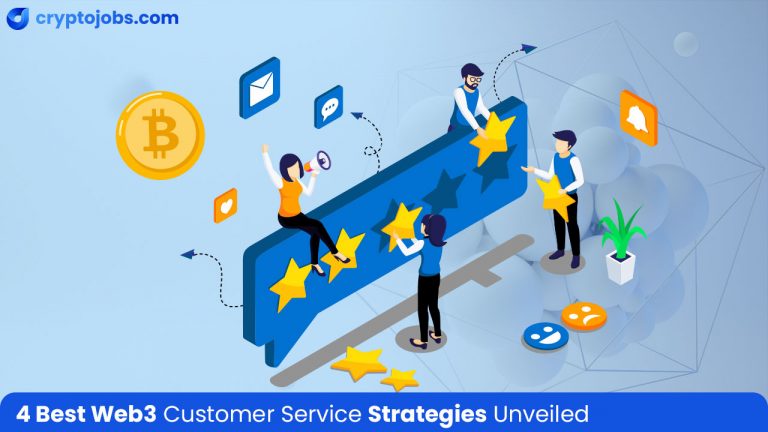
4 Best Web3 Customer Service Strategies Unveiled
- cryptojobs.com
- November 16, 2023
- All Posts, Web3
- Customer Service, Web3
- 0 Comments
Within the quickly changing field of technology, Web3 has become a revolutionary force. It promises to transform our experience of customer service as well as the way we transact. This paradigm shift goes beyond the traditional notions of support and engagement.
It is ushering in a new era of decentralized, user-centric interactions that are redefining the customer experience. Web3 career jobs in customer service are at the heart of this change. Industry pioneers have cracked the code to generate an exceptional customer experience.
Decoding Web3 Customer Services
Web3 is essentially the next generation of the internet, characterized by blockchain technology, decentralized protocols, and smart contracts. These three components give users more authority over their data, digital identities, and transactions. In the realm of customer service, this translated into a fundamental shift towards more transparent, personalized, and secure interactions.
The Web3 is truly heralding the change, and it works. Certain strategies have been immortalized and are now an industry standard. Other industries are now replicating these strategies to improve their customer experiences, too.
The four standout customer service strategies adopted by the experts are:
Strategy # 1 – Transparency and Trust
One of the key pillars of Web3 customer services is transparency. Blockchain – the underlying technology of Web3 – ensures that every interaction and transaction is recorded on an immutable ledger. This transparency not only reduces the risk of fraud but also builds trust between customers and service providers.
You may like: 7 Skills to Boost Your Web3 Digital Marketing Career
Smart Contracts further enhance transparency by automating processes. This means that customers can have confidence in the fairness of service and how predictable it is. The customers enjoy coming back to businesses that don’t require intermediaries to interact with them.
In fact, 77% of clients recommend businesses to others if they receive great customer service, while 86% will make another purchase.
Strategy # 2 – Empowering Users
In the current digital landscape, concerns about data privacy and security are at the forefront of customer’s minds. Web3 addresses these concerns by putting users in control of their personal data. Decentralized solutions enable customers to manage and share their data securely and grant permission only to those entities they trust.
This newfound control over personal data not only protects user privacy but also allows for more accurate and personalized customer service interactions. Service providers can access only the necessary information with the explicit consent of the user, leading to a more respectful and efficient exchange of information.
Strategy # 3 – Tokenomics and Incentivizing Quality Services
Web3 introduces the concept of tokenomics, where tokens are used as a form of value exchange within the ecosystem. This can be used as leverage and to incentivize quality services. For instance, users can be rewarded with tokens for providing feedback, whereas service providers can earn tokens for delivering exceptional support.
This shift from a transactional mode to a more collaborative and incentive-driven approach creates a mutually beneficial relationship between service providers and customers. Since it aligns the interests of both parties, it becomes much easier for Web3 companies to foster a community-driven ecosystem where the quality of service directly links to the success of the entire enterprise.
Strategy # 4 – Web3 as A Tool
It wouldn’t be wrong to say that Web3 has revolutionized the customer services industry. Web3 career jobs providers will vouch for the shift and how it has increased job opportunities in the industry, especially in customer services.
Traditional customer support platforms often rely on centralized databases. This makes them susceptible to data breaches and security concerns. Web3 offers a more robust solution! The risk of single-point failure is significantly reduced by distributing data across the network.
This decentralized approach not only enhances security but also ensures the availability and reliability of customer support platforms. Thanks to this, customers can access support services without interruptions. This is possible even in the time of cyber attacks and network failures. Web3 provides a more dependable and resilient customer service experience.
The Road Ahead – Challenges and Opportunities
As businesses navigate the complexities of Web3 adoption, those who successfully implement decentralized customer service solutions stand to gain a competitive edge. The early adopters have the chance to shape industry standards and establish themselves as leaders in the Web3-driven customer experience landscape.
That being said, integration with existing systems, regulating considerations, and educating customers are some of the challenges the industry as a whole has to overcome. The transformative potential of Web3 customer services lies in its ability to empower users, secure the environment, enhance security, and collaborative community. Consumers and businesses are embracing the Web3 evolution. Web3 career hopefuls may find the journey challenging, but the rewards are undoubtedly worth it. It is reimagining the relationship between customers and businesses. Instead of following the ideology of “Customer is King,” companies make customers an active participant in the entire ecosystem!




